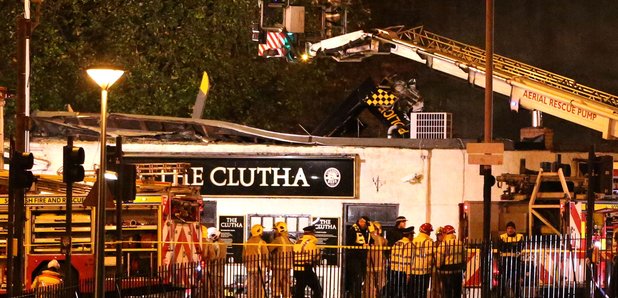Two drops of water 'could cause faulty fuel reading on Clutha crash helicopter'
13 May 2019, 16:17

Just two drops of water in a fuel sensor on board the type of helicopter that crashed into the Clutha bar could cause a faulty fuel reading, an inquiry has heard.
The police helicopter crashed through the roof of the Glasgow pub on November 29 2013, killing three people on board and seven customers in the bar.
A fatal accident inquiry was shown an information notice from helicopter manufacturer Eurocopter dated January 21 2013 regarding water contamination of the fuel system.
It stated a "couple of drops of water" concentrated between the metal tubes of the fuel level sensor may be enough to affect the signal to the display shown to the pilot.
Giving evidence to the inquiry, William Taylor, an aircraft engineer at the helicopter's Glasgow base at the time of the crash, said he was not aware before January 2013 of the possibility of water entering the fuel system after a compression wash of the engines, but would have been after the notice was issued.
The notice indicated water in the probe could lead to a degradation or failure in the fuel reading which could lead to the cockpit display showing a higher level than the true amount in the fuel tank.
Mr Taylor said daily fuel checks were carried out on the aircraft, generally before the engines had been washed.
These would check for contamination and included a test to identify water particles in the fuel.
He said it "wasn't common at all" to find water in the daily fuel samples in 2013.
He was then asked about a series of reported problems with the fuel readings that year.
The pilot handover diary recorded fuel degrade and "inaccurate fuel information" during the day on May 21 2013 but the technical record for this date and surrounding dates showed no defects.
Mr Taylor said he could not remember being aware of the issue and did not normally see the pilot handover.
Five days later the technical record showed reported erratic fuel content readings with the fault being traced to the rear fuel probe, which was replaced.
Eight days later, Mr Taylor recorded in the engineers' diary a new sensor was arriving as there was the "same fuel snag as before".
There was no entry in the technical record corresponding with this and Mr Taylor said he could not say why this would be.
He said he would expect the entries to correspond regarding a permanent defect.
In October, Mr Taylor replaced three of the four fuel supply sensors after a failure in the fuel supply tank.
The following day, October 11, a fuel supply tank was found to be indicating it had 11kgs of fuel when it was actually empty, but after being cleaned and refilled the problem was solved.
Two days before the crash, the end-of-shift report indicated the fuel contents in the main tank dropped after a period of time following refuelling and that the fuel probe should be binned if it could be changed.
Asked what steps he took regarding this, Mr Taylor said: "None that I can remember."
He said the fuel results during pre-flight checks on the day of the crash would have been clear or he would have noted this.
He said he could not recall any problem with the helicopter between it returning to base at 2.35pm after a flight to Inverness that day and his shift ending at 5pm.
The helicopter crashed into the pub later that night, killing pilot David Traill, crew members Tony Collins and Kirsty Nelis and pub customers Mark O'Prey, Gary Arthur, John McGarrigle, Colin Gibson, Robert Jenkins, Samuel McGhee and Joe Cusker.
The inquiry before Sheriff Principal Craig Turnbull continues at the temporary court at Hampden Park on Tuesday.






















